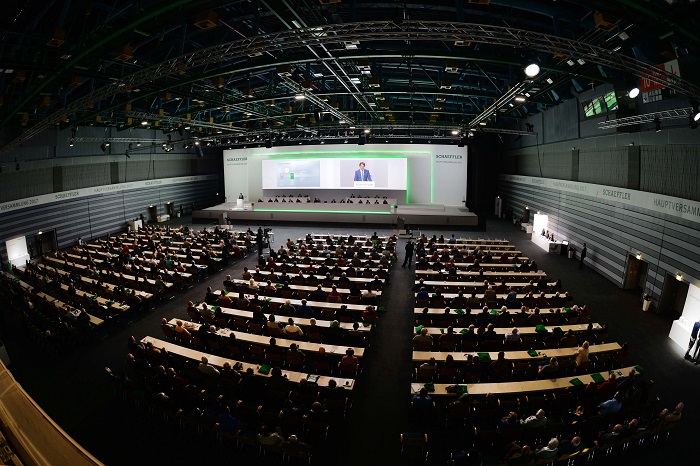
Annual general meeting of Schaeffer AG decides to increase the dividend
In his report for the 2016 financial year, Klaus Rosenfeld, CEO of Schaeffler AG, was able to present impressive results to the shareholders. In 2016, revenue increased by 3.4 percent at constant currency to approximately 13.3 billion euros. The EBIT margin before special items was 12.7 percent. Net income increased by approximately 45 percent to approximately 859 million euros. The company saw an equally positive development in free cash flow, which was doubled to 735 million euros.
In his speech, Mr. Rosenfeld focused on the “Mobility for tomorrow” strategy adopted by the Executive Board and Supervisory Board in the 2016 financial year. In addition to the established 4 focus areas “Eco-friendly drives”, “Urban mobility”, “Interurban mobility”, and “Energy chain”, 8 strategic pillars form the core of the strategy. They define the scope for action and the strategic ambitions of the Schaeffler Group. The implementation of the strategy is ensured by a company-wide program of measures with 16 strategic initiatives.
As part of its strategy, the globally active automotive and industrial supplier Schaeffler is focusing on three major fields of future development: electric mobility, Industry 4.0, and digitalization. These three future-oriented fields are both an opportunity and a challenge for the company and its best-in-class manufacturing expertise and in-depth understanding of systems. One of the most important technological changes that are taking place in the automotive industry is electric mobility and the electrification of drive trains. As an automotive supplier with a high level of manufacturing and systems expertise, Schaeffler sees this development as a major opportunity. The number of customer projects and series production orders for electric mobility products is continuously increasing. The Schaeffler Group is currently working on more than 20 customer projects. These include six series production orders for electric axles and hybrid modules for customers worldwide.
The Schaeffler Group’s manufacturing and systems expertise are also required in the field of Industry 4.0. Rolling bearings are an ideal basis for generating data with sensors. Schaeffler offers a wide range of industry-specific solutions for the digital integration of wind turbines, machine tools, rail vehicles, and drives of all kinds. By establishing so-called “digital twins” in the newly-created Schaeffler cloud, operating, wear, overload, and maintenance scenarios can be recorded and evaluated in the customers’ machines.
The third key opportunity arises from increasing digitalization, which is not only affecting the customers’ products and services, but also changing internal processes, production processes, and product development in a sustainable manner. One of the key strategic initiatives of the Schaeffler Group is therefore the “Digital Agenda” with four key digital business scenarios: “Products & Services”, “Machines & Processes”, “Analyses & Simulation”, and “User Experience & Customer Value”. More than 100 employees are currently working on more than 25 projects for the implementation of the Digital Agenda. By 2020, Schaeffler aims to have more than 600 experts working on digitalization.
“With our ‘Mobility for tomorrow’ strategy, we have laid the foundation for continuing the course for success of the Schaeffler Group in the future. We believe that the companies that will be the most successful at making the necessary changes and adaptations are those which focus on what they do best, which think in the long term, and which have a strong culture and system of values. We live by the values of a global family business, namely: sustainable, innovative, excellent, and passionate,” said Klaus Rosenfeld.






